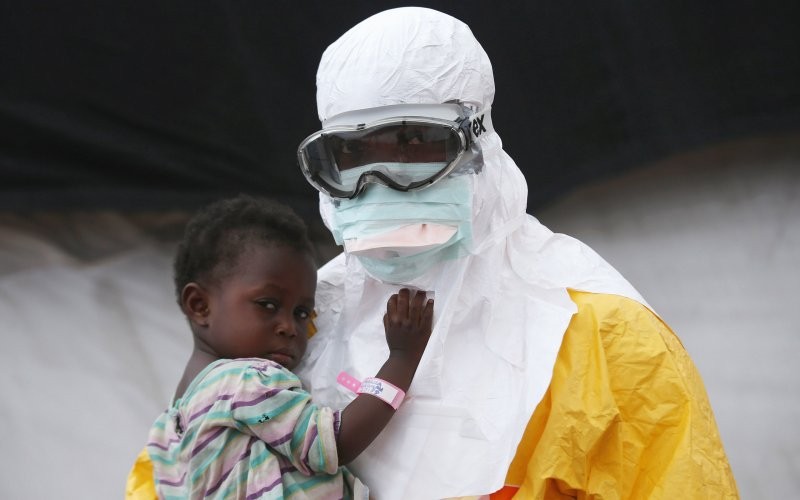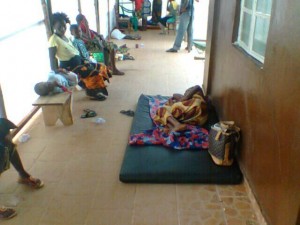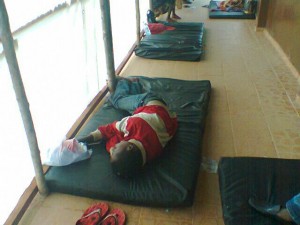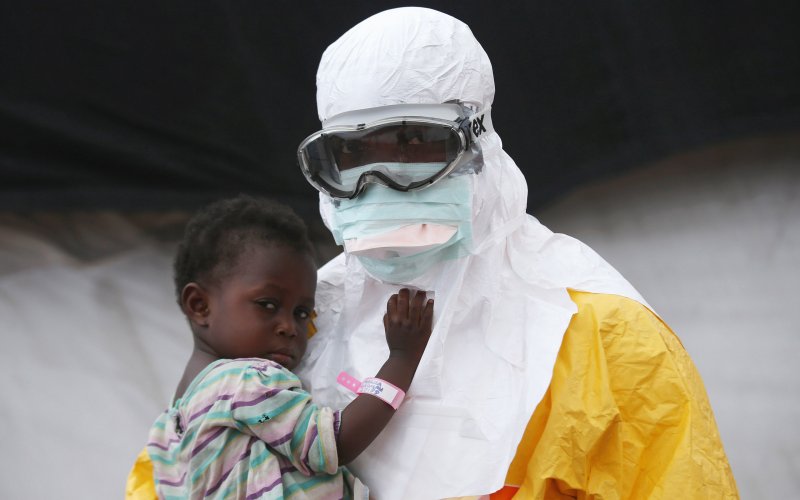
As the virus continues to wreak havoc in the country, it leaves a trail of more than 800 Orphans in Sierra Leone. From the capital, Freetown our correspondent reports.
By Abubakarr Kamara | The AfricaPaper
Freetown, Sierra Leone – With schools yet to reopen since it last closed in June this year, hundreds of children in Sierra Leone, who have been orphaned by the Ebola outbreak still do not know whether they could go to school again.
Bonjolo, 12 and Juliet Lansana, 9 have been taken in by their grandfather, after their parents died of Ebola in their little village of Kissi Teng in the Kailahun district, east of Sierra Leone. Both children are in school and despite the ‘supposedly’ free education for children their age, their parents have been doing all in their capacity to make them comfortable in school. Now as orphans, their world has changed.
Rehousing

Bonjolo and Juliet’s case is not unique as hundreds children nationwide suffer a similar fate. According to UNICEF, more than one hundred children in Kailahun district alone need to be rehoused after either or both of their parents died of Ebola.
Laygbay Lillian Amadu, Gender and Advocacy Officer at the Ministry of Social Welfare said the Ebola outbreak in Sierra Leone has made more than 813 children nationwide complete orphans since the outbreak in May this year.
“The ministry is currently identifying and mobilizing children whose parents had succumbed to the Ebola Virus Disease, as well as those who had survived the virus,” said Amadu. “After we are satisfied that they are free of the virus, we hand them over to humanitarian organizations such as SOS, Ben Hirsh, Don Bosco and Save the Children among others to take care of them.”
She further stated that the ministry has established interim care centers in Bo and Kenema to provide psychosocial counseling to orphans, adding that the National Commission for War Affected Children Centre, which would be used to house some Ebola orphans is currently on rehabilitation.
Wiped Out
Zainab Sesay, a nurse at the Ebola center in Freetown was carrying a fourteen-month baby girl whom she called Princess Sesay. Princess was still being breastfed when her mother died of Ebola in August and since they couldn’t trace her family, Zainab consented to take care of her.
“I felt very sorry for the little kid who after 21 days was declared free of Ebola,” said Sesay. “Her whole family has been wiped out by this dreaded virus and I was left with no alternative, but to take care of her.”
Child Protection Officer at the Save the Children, Fatou Fomba says they have been working with the Ministry of Social Welfare, Gender and Children’s Affairs to find foster parents for these kids noting that under normal circumstances, people do want to take care of really vulnerable children.
“But in this ‘era of Ebola’, some families aren’t coming forward to claim their children, because of either fear or the general chaos,” she said. “And when people know that a child has lost his or her parents to the Ebola virus, no one will want to take them for fear of being victimized.”
Stigma

‘I feel I have no future’: Thousands orphaned by Ebola face stigma
In Sierra Leone, children who survive Ebola or whose parents died from the virus are often shunned. Many children reach the treatment center dazed with pain or traumatized. Recently, a seven-year-old arrived after an 11-hour drive, during which her mother died.
“It’s terrifying for young children,” says Malcolm Hugo, a psychologist at the 80-bed center where dozens of staff in anti-contamination suits work. Earlier that day, he had discovered that another seven-year-old survivor had been having nightmares since being released. “I remembered [that case] very clearly because his brother died in the night and he’d stayed with the body all night.”
Amused
Yet bonds form even amid the misery. In a tent for those recovering, a talkative man wearing a heavy gold chain played up to amused doctors during the lunch break.
“I’m the president of the Ebola center!” he joked. Later though, when no one was watching, he gently encouraged a frail boy to finish his food. Mothers who have lost their own children sometimes care for young ones, doctors say.
“The hardest part of the job is telling parents their children have died, or separating children from their parents,” says Hugo.
A home was needed for a teenager, the medic said down the line. Did she have a family available by tomorrow? By the time the hour was up, three sets of children needed shelter.
Caregivers
Other pressing child welfare issues have been put on hold as agencies and the government struggle to rehouse the stream of child survivors, despite an emergency rapid registration of potential caregivers.
Crucial long-term funding hasn’t materialized, Monasch says. A recent grant from the UK government has boosted the organization, but “basically only local well-wishers are funding UNICEF”. For now, temporary caregivers receive rice, secondhand clothes for the children, toiletries and a small stipend, while regular financial help from the government and UNICEF is being considered. The ministry of social welfare has opened a temporary five-room shelter for children in Kailahun.
“No Touching”
Nevertheless, there are signs of hope, says Rosina Mahoi, a case officer with UNICEF. “Even a man in the village will know about the 21 days [virus incubation period]. Now, people observe and see if the kids are OK. Based on that, they come around.”
Growing acceptance came too late for 15-year-old Musu Allieu, whose parents both died of Ebola. Traumatized, she fled her step-grandmother’s home, where she complained that neighbors shunned them. Her two younger siblings coped better. Amidu, five, and Hawa, three, have been taken in by their step-grandmother.
As Mahoi visited one afternoon, Amidu waved shyly as Hawa bounded up, forcing her step-grandmother to shout out a reminder about the “no touching” rule in force in the town.
“You know,” she said, smiling. “People here now call her [Hawa] ‘how are you’ because she’s always running up to everyone and asking, ‘how are you?'” TAP









































